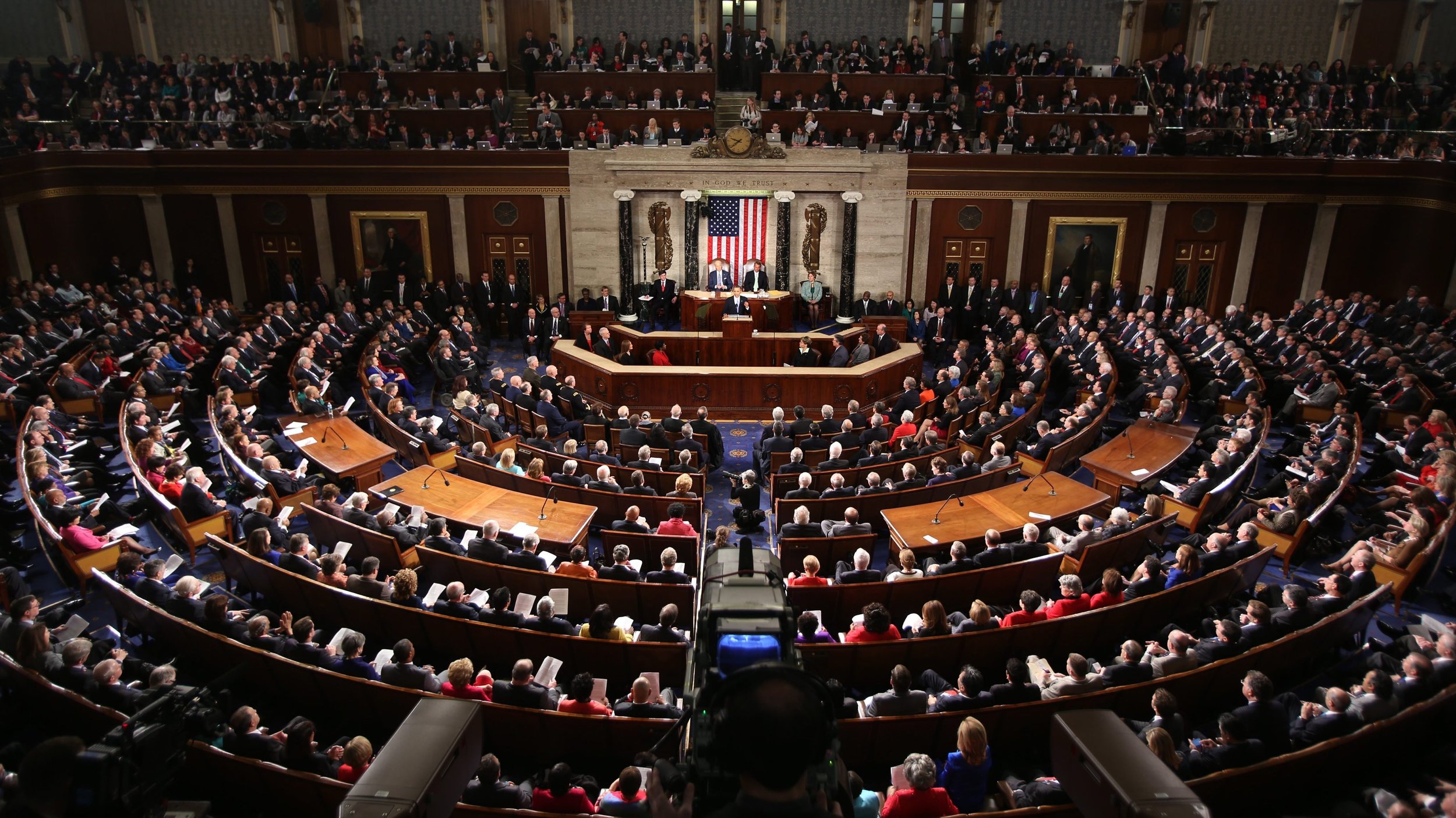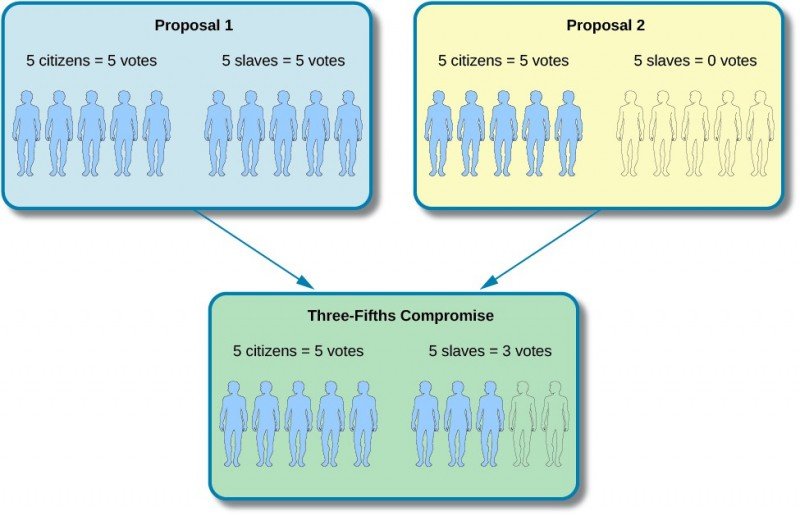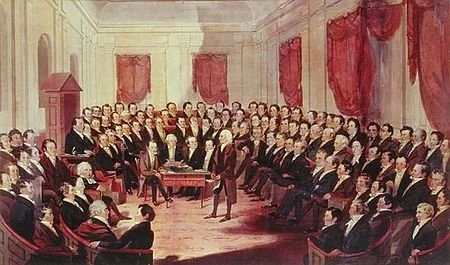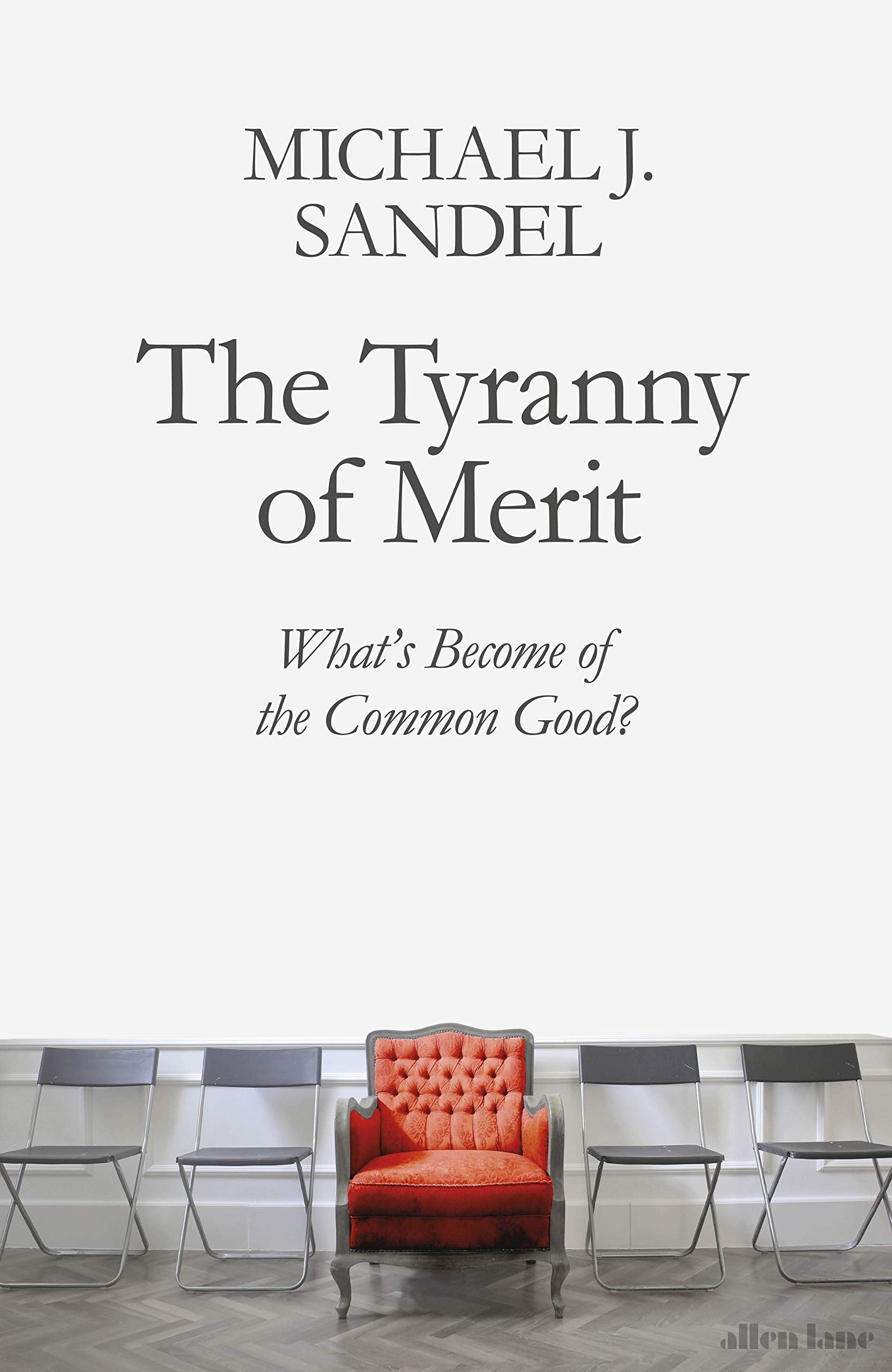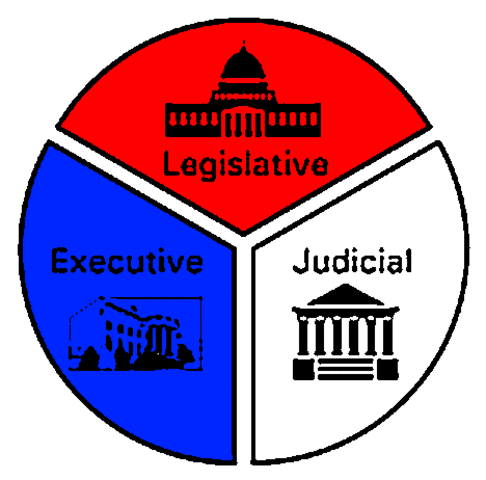The Federalist Papers #55: How Big Should the House of Representatives Be?
The Federalist Papers #55 discusses the optimal size for the House of Representatives. The author (Alexander Hamilton or James Madison) argues that there is a large range of reasonable answers:
… no political problem is less susceptible of a precise solution than that which relates to the number most convenient for a representative legislature; nor is there any point on which the policy of the several States is more at variance, whether we compare their legislative assemblies directly with each other, or consider the proportions which they respectively bear to the number of their constituents.
Nevertheless, there are some concerns that could make the size of the House of Representatives too big or too small. The danger from being too big (besides the expense, which is not mentioned) is that it might act like a mob:
… the number ought at most to be kept within a certain limit, in order to avoid the confusion and intemperance of a multitude. In all very numerous assemblies, of whatever character composed, passion never fails to wrest the sceptre from reason.
Had every Athenian citizen been a Socrates, every Athenian assembly would still have been a mob.
The behavior of large groups of people is something about which we have some social science evidence (synchronized movement can help submerge the individual within the group) and some experience that tends to bear out this concern (Occupy Wall Street and Black Lives Matter have gone to extremes because they have had no centralized leadership).
But it was the dangers of a too-small House of Representatives that were more on the minds of critics of the proposed Constitution. Quoting relevant passages, here are some of the concerns:
so small a number of representatives will be an unsafe depositary of the public interests
they will not possess a proper knowledge of the local circumstances of their numerous constituents
they will be taken from that class of citizens which will sympathize least with the feelings of the mass of the people, and be most likely to aim at a permanent elevation of the few on the depression of the many
it will be more and more disproportionate, by the increase of the people, and the obstacles which will prevent a correspondent increase of the representatives
The author of the Federalist Papers #55 allows that the first concern is important:
… a certain number at least seems to be necessary… to guard against too easy a combination for improper purposes
and adds a 5th reason for a body that is not too small:
5. a certain number at least seems to be necessary to secure the benefits of free consultation and discussion
It is taken as obvious that, at least numerically, 60 or 70 is enough to go a long way toward getting most of the benefit of having more heads to think something through. Answers to the 2d, 3d and 4th concerns is deferred to a later number.
On the worry that, if small in number, the House of Representatives could easily be bribed or could easily conspire, the Federalist Papers #55 argues that the number will soon be several hundred, and that the men who would be representatives when the body is initially less than one hundred had already passed the test of not trying to take tyrannical power during the Revolutionary War and after:
The Congress which conducted us through the Revolution was a less numerous body than their successors will be; they were not chosen by, nor responsible to, their fellow citizens at large; though appointed from year to year, and recallable at pleasure, they were generally continued for three years, and prior to the ratification of the federal articles, for a still longer term.
They held their consultations always under the veil of secrecy; they had the sole transaction of our affairs with foreign nations; through the whole course of the war they had the fate of their country more in their hands than it is to be hoped will ever be the case with our future representatives; and from the greatness of the prize at stake, and the eagerness of the party which lost it, it may well be supposed that the use of other means than force would not have been scrupled. Yet we know by happy experience that the public trust was not betrayed; nor has the purity of our public councils in this particular ever suffered, even from the whispers of calumny.
There is a strange discussion of whether the President and Senate would be rich enough to bribe the House of Representatives, motivated by the President and the Senate being a new element in the picture. But the key argument is the one above—that the likely members of the House of Representatives when it would be small were men who had been shown trustworthy by events.
How have things turned out? Now, the United States has 435 members of the House of Representatives. There are definitely concerns about those representatives being bought by moneyed interests, but I don’t see why those moneyed interests couldn’t work their co-opting magic on 4000 representatives. And I don’t notice a degeneration into acting like a mob from having so many as 435.
The question of how large a deliberative body should be is one that comes up all around the world, in many contexts. To mention just one, how many voting members should a monetary policy committee have?
Below is the full text of the Federalist Papers #55:
FEDERALIST NO. 55
The Total Number of the House of Representatives
From the New York Packet
Friday, February 15, 1788.
Author: Alexander Hamilton or James Madison
To the People of the State of New York:
THE number of which the House of Representatives is to consist, forms another and a very interesting point of view, under which this branch of the federal legislature may be contemplated.
Scarce any article, indeed, in the whole Constitution seems to be rendered more worthy of attention, by the weight of character and the apparent force of argument with which it has been assailed.
The charges exhibited against it are, first, that so small a number of representatives will be an unsafe depositary of the public interests; secondly, that they will not possess a proper knowledge of the local circumstances of their numerous constituents; thirdly, that they will be taken from that class of citizens which will sympathize least with the feelings of the mass of the people, and be most likely to aim at a permanent elevation of the few on the depression of the many; fourthly, that defective as the number will be in the first instance, it will be more and more disproportionate, by the increase of the people, and the obstacles which will prevent a correspondent increase of the representatives. In general it may be remarked on this subject, that no political problem is less susceptible of a precise solution than that which relates to the number most convenient for a representative legislature; nor is there any point on which the policy of the several States is more at variance, whether we compare their legislative assemblies directly with each other, or consider the proportions which they respectively bear to the number of their constituents. Passing over the difference between the smallest and largest States, as Delaware, whose most numerous branch consists of twenty-one representatives, and Massachusetts, where it amounts to between three and four hundred, a very considerable difference is observable among States nearly equal in population. The number of representatives in Pennsylvania is not more than one fifth of that in the State last mentioned. New York, whose population is to that of South Carolina as six to five, has little more than one third of the number of representatives. As great a disparity prevails between the States of Georgia and Delaware or Rhode Island. In Pennsylvania, the representatives do not bear a greater proportion to their constituents than of one for every four or five thousand. In Rhode Island, they bear a proportion of at least one for every thousand. And according to the constitution of Georgia, the proportion may be carried to one to every ten electors; and must unavoidably far exceed the proportion in any of the other States. Another general remark to be made is, that the ratio between the representatives and the people ought not to be the same where the latter are very numerous as where they are very few. Were the representatives in Virginia to be regulated by the standard in Rhode Island, they would, at this time, amount to between four and five hundred; and twenty or thirty years hence, to a thousand. On the other hand, the ratio of Pennsylvania, if applied to the State of Delaware, would reduce the representative assembly of the latter to seven or eight members. Nothing can be more fallacious than to found our political calculations on arithmetical principles. Sixty or seventy men may be more properly trusted with a given degree of power than six or seven. But it does not follow that six or seven hundred would be proportionably a better depositary. And if we carry on the supposition to six or seven thousand, the whole reasoning ought to be reversed. The truth is, that in all cases a certain number at least seems to be necessary to secure the benefits of free consultation and discussion, and to guard against too easy a combination for improper purposes; as, on the other hand, the number ought at most to be kept within a certain limit, in order to avoid the confusion and intemperance of a multitude. In all very numerous assemblies, of whatever character composed, passion never fails to wrest the sceptre from reason.
Had every Athenian citizen been a Socrates, every Athenian assembly would still have been a mob.
It is necessary also to recollect here the observations which were applied to the case of biennial elections. For the same reason that the limited powers of the Congress, and the control of the State legislatures, justify less frequent elections than the public safely might otherwise require, the members of the Congress need be less numerous than if they possessed the whole power of legislation, and were under no other than the ordinary restraints of other legislative bodies. With these general ideas in our mind, let us weigh the objections which have been stated against the number of members proposed for the House of Representatives. It is said, in the first place, that so small a number cannot be safely trusted with so much power. The number of which this branch of the legislature is to consist, at the outset of the government, will be sixty five. Within three years a census is to be taken, when the number may be augmented to one for every thirty thousand inhabitants; and within every successive period of ten years the census is to be renewed, and augmentations may continue to be made under the above limitation. It will not be thought an extravagant conjecture that the first census will, at the rate of one for every thirty thousand, raise the number of representatives to at least one hundred. Estimating the negroes in the proportion of three fifths, it can scarcely be doubted that the population of the United States will by that time, if it does not already, amount to three millions. At the expiration of twenty-five years, according to the computed rate of increase, the number of representatives will amount to two hundred, and of fifty years, to four hundred. This is a number which, I presume, will put an end to all fears arising from the smallness of the body. I take for granted here what I shall, in answering the fourth objection, hereafter show, that the number of representatives will be augmented from time to time in the manner provided by the Constitution. On a contrary supposition, I should admit the objection to have very great weight indeed. The true question to be decided then is, whether the smallness of the number, as a temporary regulation, be dangerous to the public liberty? Whether sixty-five members for a few years, and a hundred or two hundred for a few more, be a safe depositary for a limited and well-guarded power of legislating for the United States? I must own that I could not give a negative answer to this question, without first obliterating every impression which I have received with regard to the present genius of the people of America, the spirit which actuates the State legislatures, and the principles which are incorporated with the political character of every class of citizens I am unable to conceive that the people of America, in their present temper, or under any circumstances which can speedily happen, will choose, and every second year repeat the choice of, sixty-five or a hundred men who would be disposed to form and pursue a scheme of tyranny or treachery. I am unable to conceive that the State legislatures, which must feel so many motives to watch, and which possess so many means of counteracting, the federal legislature, would fail either to detect or to defeat a conspiracy of the latter against the liberties of their common constituents. I am equally unable to conceive that there are at this time, or can be in any short time, in the United States, any sixty-five or a hundred men capable of recommending themselves to the choice of the people at large, who would either desire or dare, within the short space of two years, to betray the solemn trust committed to them. What change of circumstances, time, and a fuller population of our country may produce, requires a prophetic spirit to declare, which makes no part of my pretensions. But judging from the circumstances now before us, and from the probable state of them within a moderate period of time, I must pronounce that the liberties of America cannot be unsafe in the number of hands proposed by the federal Constitution. From what quarter can the danger proceed? Are we afraid of foreign gold? If foreign gold could so easily corrupt our federal rulers and enable them to ensnare and betray their constituents, how has it happened that we are at this time a free and independent nation? The Congress which conducted us through the Revolution was a less numerous body than their successors will be; they were not chosen by, nor responsible to, their fellow citizens at large; though appointed from year to year, and recallable at pleasure, they were generally continued for three years, and prior to the ratification of the federal articles, for a still longer term.
They held their consultations always under the veil of secrecy; they had the sole transaction of our affairs with foreign nations; through the whole course of the war they had the fate of their country more in their hands than it is to be hoped will ever be the case with our future representatives; and from the greatness of the prize at stake, and the eagerness of the party which lost it, it may well be supposed that the use of other means than force would not have been scrupled. Yet we know by happy experience that the public trust was not betrayed; nor has the purity of our public councils in this particular ever suffered, even from the whispers of calumny. Is the danger apprehended from the other branches of the federal government?
But where are the means to be found by the President, or the Senate, or both? Their emoluments of office, it is to be presumed, will not, and without a previous corruption of the House of Representatives cannot, more than suffice for very different purposes; their private fortunes, as they must all be American citizens, cannot possibly be sources of danger. The only means, then, which they can possess, will be in the dispensation of appointments. Is it here that suspicion rests her charge? Sometimes we are told that this fund of corruption is to be exhausted by the President in subduing the virtue of the Senate. Now, the fidelity of the other House is to be the victim. The improbability of such a mercenary and perfidious combination of the several members of government, standing on as different foundations as republican principles will well admit, and at the same time accountable to the society over which they are placed, ought alone to quiet this apprehension. But, fortunately, the Constitution has provided a still further safeguard. The members of the Congress are rendered ineligible to any civil offices that may be created, or of which the emoluments may be increased, during the term of their election.
No offices therefore can be dealt out to the existing members but such as may become vacant by ordinary casualties: and to suppose that these would be sufficient to purchase the guardians of the people, selected by the people themselves, is to renounce every rule by which events ought to be calculated, and to substitute an indiscriminate and unbounded jealousy, with which all reasoning must be vain. The sincere friends of liberty, who give themselves up to the extravagancies of this passion, are not aware of the injury they do their own cause. As there is a degree of depravity in mankind which requires a certain degree of circumspection and distrust, so there are other qualities in human nature which justify a certain portion of esteem and confidence. Republican government presupposes the existence of these qualities in a higher degree than any other form. Were the pictures which have been drawn by the political jealousy of some among us faithful likenesses of the human character, the inference would be, that there is not sufficient virtue among men for self-government; and that nothing less than the chains of despotism can restrain them from destroying and devouring one another.
PUBLIUS.
Links to my other posts on The Federalist Papers so far:
The Federalist Papers #1: Alexander Hamilton's Plea for Reasoned Debate
The Federalist Papers #3: United, the 13 States are Less Likely to Stumble into War
The Federalist Papers #4 B: National Defense Will Be Stronger if the States are United
The Federalist Papers #5: Unless United, the States Will Be at Each Others' Throats
The Federalist Papers #6 A: Alexander Hamilton on the Many Human Motives for War
The Federalist Papers #11 A: United, the States Can Get a Better Trade Deal—Alexander Hamilton
The Federalist Papers #12: Union Makes it Much Easier to Get Tariff Revenue—Alexander Hamilton
The Federalist Papers #13: Alexander Hamilton on Increasing Returns to Scale in National Government
The Federalist Papers #14: A Republic Can Be Geographically Large—James Madison
The Federalist Papers #21 A: Constitutions Need to be Enforced—Alexander Hamilton
The Federalist Papers #24: The United States Need a Standing Army—Alexander Hamilton
The Federalist Papers #27: People Will Get Used to the Federal Government—Alexander Hamilton
The Federalist Papers #30: A Robust Power of Taxation is Needed to Make a Nation Powerful
The Federalist Papers #35 A: Alexander Hamilton as an Economist
The Federalist Papers #35 B: Alexander Hamilton on Who Can Represent Whom
The Federalist Papers #36: Alexander Hamilton on Regressive Taxation
The Federalist Papers #39: James Madison Downplays How Radical the Proposed Constitution Is
The Federalist Papers #41: James Madison on Tradeoffs—You Can't Have Everything You Want
The Federalist Papers #42: Every Power of the Federal Government Must Be Justified—James Madison
The Federalist Papers #44: Constitutional Limitations on the Powers of the States—James Madison
The Federalist Papers #45: James Madison Predicts a Small Federal Government
The Federalist Papers #48: Legislatures, Too, Can Become Tyrannical—James Madison
The Federalist Papers #49: Constitutional Conventions Should Be Few and Far Between
The Federalist Papers #50: Periodic Commissions to Judge Constitutionality Won't Work
The Federalist Papers #51 A: Checks and Balance, or ‘Who Guards the Guardians?'
